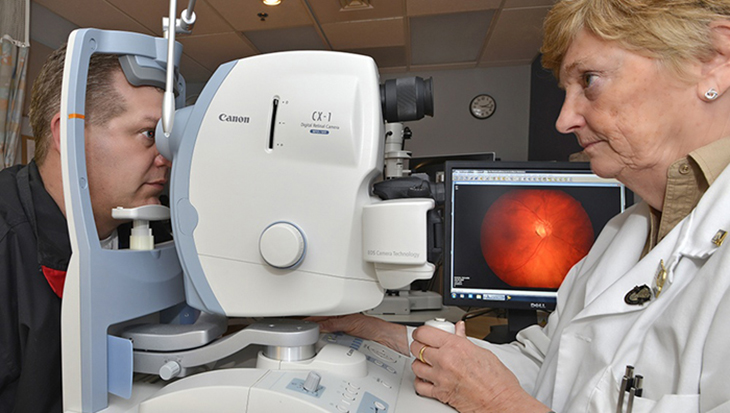Veterans are at higher risk of eye disease than the average U.S. person. The most common eye problems Veterans get are cataract, glaucoma, macular degeneration and damage to the eyes from diabetes. With January being National Glaucoma Awareness Month and February being Age-Related Macular Degeneration/Low Vision Awareness Month, now is a good time to focus on these issues.
Aside from the higher prevalence of vision problems among Veterans, they may also face special challenges getting prompt eye care. For example, Veterans in rural areas may need to travel long distances to the nearest eye clinic, and their vision may suffer as a result.
At the Center for Visual and Neurocognitive Rehabilitation, based at the Atlanta VA Medical Center, we and our colleagues are pursuing a number of innovative projects aimed at finding solutions to Veterans’ vision problems. Below are three examples.
Technology-based Eye Care Services (TECS)—Led by Dr. April Maa, with funding from VA, the Atlanta VA Eye Clinic has developed an eye-screening program called Technology-based Eye Care Services (TECS). This program allows patients to be checked for eyeglasses and screened for common eye diseases using special equipment and eye photographs at their local VA community-based outpatient clinic (CBOC). The program is currently available at five CBOCs. In two studies that involved 2,600 Veterans, now in press, TECS improved the ability of patients to get screening appointments and mitigated the distance traveled by Veterans and the time they spent trying to get eye care. While the program is not meant to replace an in-person eye exam, TECS also helped find possible vision-threatening disease in nearly 1 in 3 patients who were checked. The program is now being spread to other VA hospitals across the country with the continued goal of preventing blindness.
Precision navigation for people who are blind—This project, funded by the National Institutes of Health and led by David Ross aims to develop a precision navigation app for people without sight. Existing navigation apps rely on GPS, which can typically guide one to within sighting distance of a location (30 to 60 feet), but cannot provide the cane-reach accuracy needed by those without sight. To achieve this accuracy, we are analyzing the unique walking patterns of people who use a white cane. This information will be used to accurately track their step-by-step movement from a known location, such as a building exit. When combined with GPS data, our system, we believe, will achieve cane-reach accuracy. We will also develop a mapping database whereby satellite maps can be annotated to indicate the exact coordinates of building entrances, crosswalks, bus stops, and other such locations. Using this database, we hypothesize the developed app will be able to guide the user to within cane-touch distance of known locations. The developed app will be evaluated by blinded Veterans in their own neighborhoods at various sites around the country.
Spatial cognitive training for blind Veterans—A VA-funded project led by Dr. Krish Sathian builds on prior work showing that blindness impairs the spatial skills that are so necessary for navigating around the environment. The project aims to improve these spatial skills by training. Blind veterans recruited for the study will receive iPads to take home for three weeks. During this time, they will engage in tele-training over the internet, completing a task involving imagined movement through a five-by-five grid. Their spatial skills will be tested before and after training to examine whether this training is superior to a control procedure. We will also conduct brain scans, using a method known as functional magnetic resonance imaging (fMRI), to assess how the brain responds to the training. Current rehabilitation for those with vision loss includes orientation and mobility training, with a focus on safe navigation. The goal of this research is to augment these Veterans’ spatial skills training.
We at the center, along with our research colleagues throughout VA and at our partner institutions, are hopeful these projects and others will make a tangible difference in the lives of Veterans affected by vision loss and other vision-related problems.
About the authors: Krish Sathian, M.D., Ph.D., is executive director of the Center for Visual and Neurocognitive Rehabilitation. The center, based at the Atlanta VA Medical Center, is funded by VA’s Rehabilitation Research and Development Service. Sathian is also a professor of neurology at Emory University. April Maa, M.D., a center investigator, directs the TECS Program and is a comprehensive ophthalmologist at the Atlanta VAMC Eye Clinic, as well as an assistant professor of ophthalmology at Emory University. David Ross, M.Ed., MSEE, another center investigator, is a rehabilitation engineer with a focus on developing technology for visually impaired people.
Topics in this story
More Stories
Bob Jesse Award celebrates the achievements of a VA employee and a team or department that exemplifies innovative practices within VA.
The Medical Foster Home program offers Veterans an alternative to nursing homes.
Watch the Under Secretary for Health and a panel of experts discuss VA Health Connect tele-emergency care.







I live in New Mexico is Atlanta the closest place you have the TECS
I can never get any help from my VA hospital (Harry S Truman VA Hospital, Columbia, Mo. ) I have ask thme for help, I can’t hardly see, I can’t drive, I can’t see to read but I try, I have to use a magnafireing glasses. I have even asked for some eye drops for over a year and still have not seen any. I am a diabetic and on four shots a day.
Just wondering why it takes 8 weeks or more to get glasses thru the VA unless I can pay for them up front I’m not complaining I just don’t understand if I could afford to buy them I would and let another vet have them that needs them